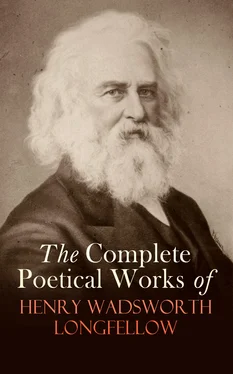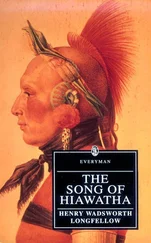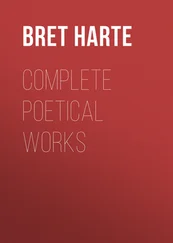Table of Contents
SCENE I.—The COUNT OF LARA'S chambers. Night. The COUNT in his
dressing-gown, smoking and conversing with DON CARLOS.
Lara. You were not at the play tonight, Don Carlos;
How happened it?
Don C. I had engagements elsewhere.
Pray who was there?
Lara. Why all the town and court.
The house was crowded; and the busy fans
Among the gayly dressed and perfumed ladies
Fluttered like butterflies among the flowers.
There was the Countess of Medina Celi;
The Goblin Lady with her Phantom Lover,
Her Lindo Don Diego; Dona Sol,
And Dona Serafina, and her cousins.
Don C. What was the play?
Lara. It was a dull affair;
One of those comedies in which you see,
As Lope says, the history of the world
Brought down from Genesis to the Day of Judgment.
There were three duels fought in the first act,
Three gentlemen receiving deadly wounds,
Laying their hands upon their hearts, and saying,
"O, I am dead!" a lover in a closet,
An old hidalgo, and a gay Don Juan,
A Dona Inez with a black mantilla,
Followed at twilight by an unknown lover,
Who looks intently where he knows she is not!
Don C. Of course, the Preciosa danced to-night?
Lara. And never better. Every footstep fell
As lightly as a sunbeam on the water.
I think the girl extremely beautiful.
Don C. Almost beyond the privilege of woman!
I saw her in the Prado yesterday.
Her step was royal—queen-like—and her face
As beautiful as a saint's in Paradise.
Lara. May not a saint fall from her Paradise,
And be no more a saint?
Don C. Why do you ask?
Lara. Because I have heard it said this angel fell,
And though she is a virgin outwardly,
Within she is a sinner; like those panels
Of doors and altar-pieces the old monks
Painted in convents, with the Virgin Mary
On the outside, and on the inside Venus!
Don C. You do her wrong; indeed, you do her wrong!
She is as virtuous as she is fair.
Lara. How credulous you are! Why look you, friend,
There's not a virtuous woman in Madrid,
In this whole city! And would you persuade me
That a mere dancing-girl, who shows herself,
Nightly, half naked, on the stage, for money,
And with voluptuous motions fires the blood
Of inconsiderate youth, is to be held
A model for her virtue?
Don C. You forget
She is a Gypsy girl.
Lara. And therefore won
The easier.
Don C. Nay, not to be won at all!
The only virtue that a Gypsy prizes
Is chastity. That is her only virtue.
Dearer than life she holds it. I remember
A Gypsy woman, a vile, shameless bawd,
Whose craft was to betray the young and fair;
And yet this woman was above all bribes.
And when a noble lord, touched by her beauty,
The wild and wizard beauty of her race,
Offered her gold to be what she made others,
She turned upon him, with a look of scorn,
And smote him in the face!
Lara. And does that prove
That Preciosa is above suspicion?
Don C. It proves a nobleman may be repulsed
When he thinks conquest easy. I believe
That woman, in her deepest degradation,
Holds something sacred, something undefiled,
Some pledge and keepsake of her higher nature,
And, like the diamond in the dark, retains
Some quenchless gleam of the celestial light!
Lara. Yet Preciosa would have taken the gold.
Don C. (rising). I do not think so.
Lara. I am sure of it.
But why this haste? Stay yet a little longer,
And fight the battles of your Dulcinea.
Don C. 'T is late. I must begone, for if I stay
You will not be persuaded.
Lara. Yes; persuade me.
Don C. No one so deaf as he who will not hear!
Lara. No one so blind as he who will not see!
Don C. And so good night. I wish you pleasant dreams,
And greater faith in woman. [Exit.
Lara. Greater faith!
I have the greatest faith; for I believe
Victorian is her lover. I believe
That I shall be to-morrow; and thereafter
Another, and another, and another,
Chasing each other through her zodiac,
As Taurus chases Aries.
(Enter FRANCISCO with a casket.)
Well, Francisco,
What speed with Preciosa?
Fran. None, my lord.
She sends your jewels back, and bids me tell you
She is not to be purchased by your gold.
Lara. Then I will try some other way to win her.
Pray, dost thou know Victorian?
Fran. Yes, my lord;
I saw him at the jeweller's to-day.
Lara. What was he doing there?
Fran. I saw him buy
A golden ring, that had a ruby in it.
Lara. Was there another like it?
Fran. One so like it
I could not choose between them.
Lara. It is well.
To-morrow morning bring that ring to me.
Do not forget. Now light me to my bed.
[Exeunt.
SCENE II. — A street in Madrid. Enter CHISPA, followed by
musicians, with a bagpipe, guitars, and other instruments.
Chispa. Abernuncio Satanas! and a plague on all lovers who
ramble about at night, drinking the elements, instead of
sleeping quietly in their beds. Every dead man to his cemetery,
say I; and every friar to his monastery. Now, here's my master,
Victorian, yesterday a cow-keeper, and to-day a gentleman;
yesterday a student, and to-day a lover; and I must be up later
than the nightingale, for as the abbot sings so must the
sacristan respond. God grant he may soon be married, for then
shall all this serenading cease. Ay, marry! marry! marry!
Mother, what does marry mean? It means to spin, to bear
children, and to weep, my daughter! And, of a truth, there is
something more in matrimony than the wedding-ring. (To the
musicians.) And now, gentlemen, Pax vobiscum! as the ass said to
the cabbages. Pray, walk this way; and don't hang down your
heads. It is no disgrace to have an old father and a ragged
shirt. Now, look you, you are gentlemen who lead the life of
crickets; you enjoy hunger by day and noise by night. Yet, I
beseech you, for this once be not loud, but pathetic; for it is a
serenade to a damsel in bed, and not to the Man in the Moon.
Your object is not to arouse and terrify, but to soothe and bring
lulling dreams. Therefore, each shall not play upon his
instrument as if it were the only one in the universe, but
gently, and with a certain modesty, according with the others.
Pray, how may I call thy name, friend?
First Mus. Geronimo Gil, at your service.
Chispa. Every tub smells of the wine that is in it. Pray,
Geronimo, is not Saturday an unpleasant day with thee?
First Mus. Why so?
Chispa. Because I have heard it said that Saturday is an
unpleasant day with those who have but one shirt. Moreover, I
have seen thee at the tavern, and if thou canst run as fast as
thou canst drink, I should like to hunt hares with thee. What
instrument is that?
First Mus. An Aragonese bagpipe.
Chispa. Pray, art thou related to the bagpiper of Bujalance,
who asked a maravedi for playing, and ten for leaving off?
First Mus. No, your honor.
Chispa. I am glad of it. What other instruments have we?
Second and Third Musicians. We play the bandurria.
Chispa. A pleasing instrument. And thou?
Fourth Mus. The fife.
Chispa. I like it; it has a cheerful, soul-stirring sound,
that soars up to my lady's window like the song of a swallow.
And you others?
Other Mus. We are the singers, please your honor.
Chispa. You are too many. Do you think we are going to sing
Читать дальше












